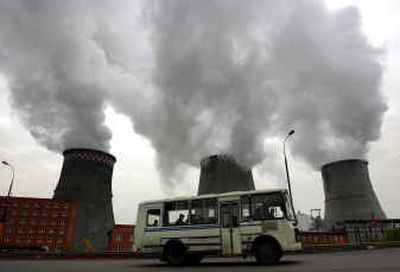Global warming treaty to take effect

MOSCOW – Russia’s lower house of parliament ratified the long-stalled Kyoto climate change treaty on Friday, clearing the last major hurdle for the global pact to take force seven years after it was drafted.
The State Duma voted 334-73 to approve the treaty on the recommendation of President Vladimir Putin, following years of bitter debate in Moscow and around the world about balancing economic growth and environmental health.
Russia’s decision essentially guarantees that the Kyoto agreement will go into effect. The treaty, which commits industrial nations to curb production of carbon dioxide and other greenhouse gases that many scientists blame for global warming, required ratification by countries responsible for at least 55 percent of the world’s emissions. Because the United States opted out of the agreement in 2001, only Russia, with 17 percent, could put it over the threshold.
“It’s a great event that took place, not only for Russia but for the rest of the world,” said Vladimir Zakharov, director of the Moscow-based Center for Russian Environmental Policy and co-chairman of Russia’s Social Forum on Climate Change. The two advocacy groups have been lobbying for ratification of the agreement, which was negotiated in Kyoto, Japan, in 1997.
Putin had endorsed the accord several times in the last few years without ever actually allowing a Duma vote. The breakthrough came in May, when he concluded a deal with the European Union in which he agreed to secure ratification in exchange for E.U. support for Russian membership in the World Trade Organization.
Kremlin factions opposed to Kyoto waged a last-ditch campaign to kill it, led by Putin’s top economic adviser, Andrei Illarionov, who has termed the pact a “death treaty” that would strangle the growing Russian economy. But Putin settled the matter when his Cabinet endorsed it on Sept. 30.
“It’s detrimental to Russian interests, and I strongly advised our government in this respect to follow the example of the United States,” Natalya Narochnitskaya, a Duma deputy from the nationalist Motherland party, said in an interview after the vote. She said the Kremlin embraced the treaty “to appease the Western society,” which has assailed Putin for rolling back democratic institutions.
On Wednesday, the treaty goes to the largely ceremonial upper house of parliament for approval, which has always been a formality in post-Soviet Russia. It will then go back to Putin for his signature.
The treaty requires participating industrial countries to reduce emissions of greenhouse gases by 5.2 percent below 1990 levels by 2012. For Russia, the terms could prove an economic boon, because its levels have already fallen about 25 percent since 1990 in the industrial collapse that followed the breakup of the Soviet Union. Russia stands to earn billions of dollars by selling its excess quotas, as the treaty allows, to countries not in compliance with the requirement.